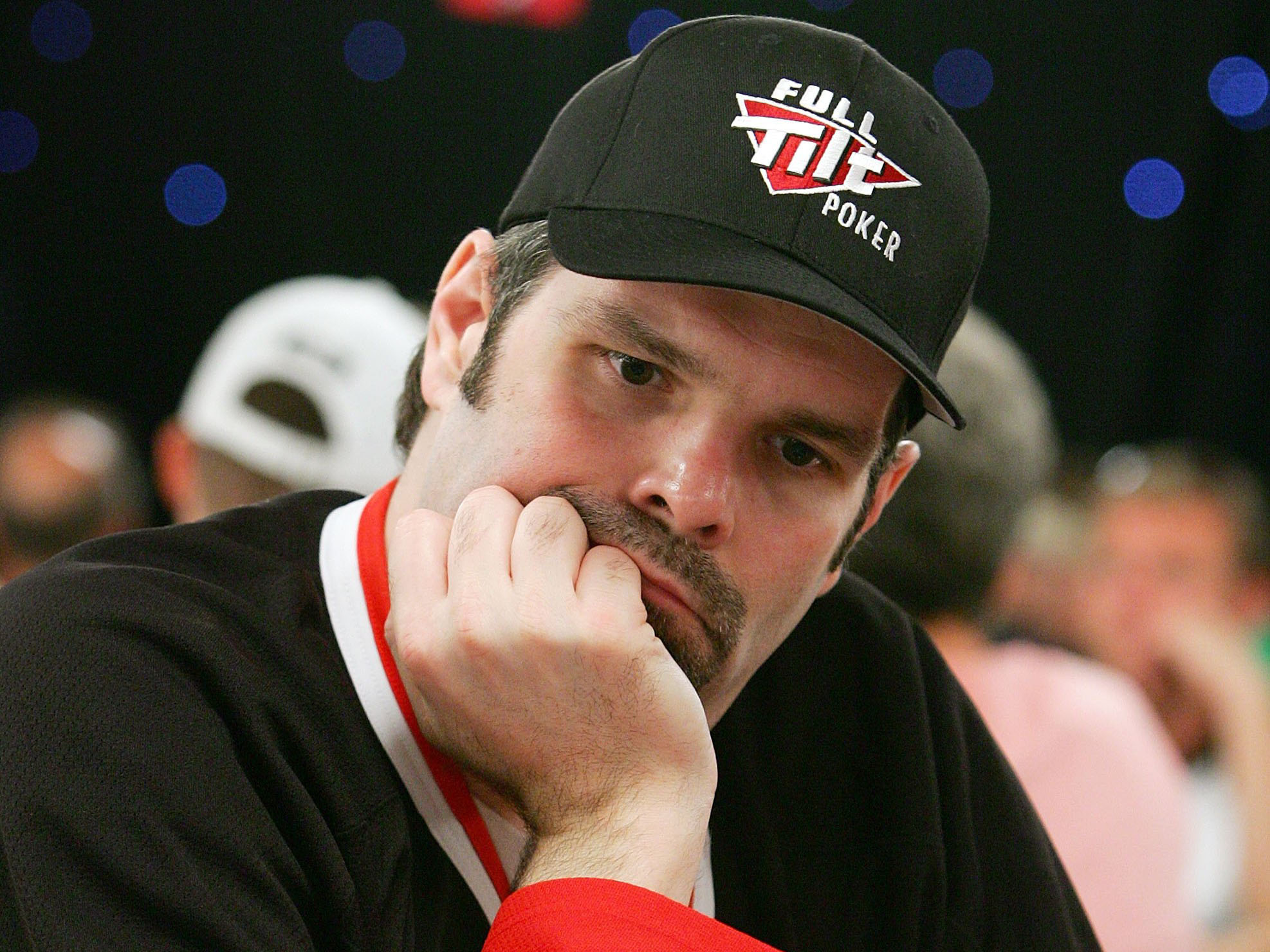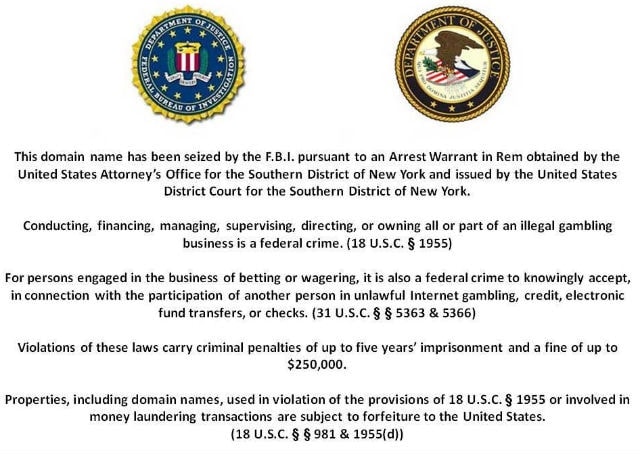Exactly 10 years ago today, on a day dubbed “Black Friday,” online poker players in the US received quite the rude awakening when they attempted to log into their poker site accounts. On April 15, 2011, the US Department of Justice dealt a crushing blow to the poker community by dropping the hammer on all of the major poker sites operating in America.

Black Friday was arguably the most devastating event in poker history. On that fateful day, the DOJ seized the domains of the three most popular poker sites at the time — PokerStars, Full Tilt Poker, and Absolute Poker/Ultimate Bet — while, at the same time, unsealing a 52-page indictment against prominent executives of those sites.
High-profile names within the online poker industry, including Full Tilt CEO Ray Bitar and PokerStars founder Isai Scheinberg, among others, were charged with violating the Unlawful Internet Gambling Act of 2006 (UIEGA), a law designed to prevent businesses from knowingly accepting payments in connection with online betting and gambling.
Additional charges included money laundering, bank fraud, and illegal gambling. Online poker wasn’t regulated in any state at the time, and many prominent poker pros knew the government could come after gambling sites that operated in the US. Still, despite the risk, many players and industry insiders were taken by surprise when the crackdown happened.
Awoken to an unpleasant surprise
Back in 2011, online poker was booming all around the world. Full Tilt Poker and PokerStars were so popular that many top pros were paid five and six-figure salaries to promote the brands. Many remember the famous FTP slogan, “Learn, Chat, and Play With the Pros” that helped attract hundreds of thousands of players to the only poker site that was a true competitor to PokerStars in the past 15 years.
Mike Matusow, Phil Ivey, Erik Seidel, Jennifer Harman, Gus Hansen, Chris Ferguson, and Howard Lederer were among those who sported the famous triangular Full Tilt patch back in the day. PokerStars, meanwhile, had Negreanu, Chris Moneymaker, Joe Hachem, Barry Greenstein, and just about every other high-profile player who wasn’t an FTP pro.
The major sites were booming, and so was the entire online poker industry in the US, even though the sites weren’t regulated. Thousands of pros were making six-and-seven-figure incomes grinding the soft and juicy online games. But that all came to a screeching halt when American internet poker players were greeted by the following message when they tried logging in on April 15, 2011.
 No one at the time knew how long the shutdown would last, or what the long-term ramifications might entail. Many were concerned that their account balances would be forfeit, and they had every reason to be.
No one at the time knew how long the shutdown would last, or what the long-term ramifications might entail. Many were concerned that their account balances would be forfeit, and they had every reason to be.
In the weeks following the Black Friday scandal, players on sites like FTP and UB were still awaiting money that they needed to pay rent or make car payments, and everyone was left in limbo. PokerStars, on the other hand, began the process of making its players whole less than 10 days after the DOJ shut down its US operations.
Playing the waiting game
Full Tilt Poker and Absolute Poker/Ultimate Bet were poorly managed sites, and that proved costly for thousands of US poker players. When Black Friday hit, it became clear to thousands of poker players that those two sites weren’t financially prepared for the situation.
But executives for FTP, including two popular pros (Ferguson, Lederer), were still receiving multi-million dollar payouts at a time when the poker site didn’t have enough in reserve to pay out the US players. For that very reason, numerous poker players began to despise Lederer and Ferguson. They both disappeared completely from the poker community until resurfacing at the 2016 WSOP.
Making them whole
While PokerStars had managed to refund its US customers within a few months after being shut down, other sites, including Full Tilt, didn’t have the funds to make things right.
In July 2012, however, PokerStars reached an agreement with the DOJ to acquire Full Tilt Poker. As part of the acquisition, the internet gambling giant was required to forfeit $547 million to the government over three years, much of which was used to pay off the outstanding FTP player account balances within 90 days.
It took nearly two years for most Full Tilt players to finally get paid following Black Friday, which pales in comparison to customers of the Cereus Poker Network, owners of the defunct Absolute Poker and Ultimate Bet poker sites.
Cereus was so poorly managed that they simply didn’t have any money available to pay off the players, and never would make any efforts to make them whole. But in 2017, out of nowhere, the US government began processing claims of Cereus Poker Network fraud victims, and most players received payments within six months to a year. Many AP/UB players had given up on ever seeing that money, and when it finally arrived, they were almost in shock.
Lasting effects of Black Friday
Black Friday is still lingering within the US online poker industry 10 years later. Although some states now have legal poker sites in operation, it just isn’t the same. There are no licensed or unlicensed global sites that have hundreds of thousands of customers operating within the United States. And, at present, only five states out of 50 — Delaware, Michigan, Nevada, New Jersey, and Pennsylvania — have legal online poker games.
Some of the issues online poker faced in its return can be laid at the feet of the recently departed Sheldon Adelson, who as owner of the Sands Corporation (parent company of the Venetian in Las Vegas), was a long-time opponent of online poker, regularly used his wealth and power to lobby against its legalization.
While the industry has slowly started to recover following Black Friday, there are many battles ahead for the poker community, some of which may never be won, including the fight for national legislation legalizing online poker throughout the country.
One positive development since Black Friday, however, was an important court ruling in September 2011. At that time, the DOJ released a formal legal opinion on the scope of the Federal Wire Act of 1961, a law that prevents businesses from knowingly using wire communications to accept wagers. According to the publicly released opinion, the DOJ determined that the Wire Act only applied to sports betting and not other forms of gambling.
That paved the way for individual states to offer online poker within their own borders. Delaware, New Jersey, and Nevada became the first three states to do so in 2013, with other states such as Michigan and Pennsylvania following in recent years. West Virginia legalized online poker in 2019, but to date, there are no platforms in the state for residents to play on.)
While this is undoubtedly a positive step in the right direction for the industry, it’s been a slow process over the past eight years, creating a thin patchwork of areas in which people can play poker online across the US. Other states, including New York, Massachusetts, Connecticut, and Florida have all flirted with legalizing online poker in recent years, but have failed to do so, and are not likely to make games available to their residents anytime soon.


